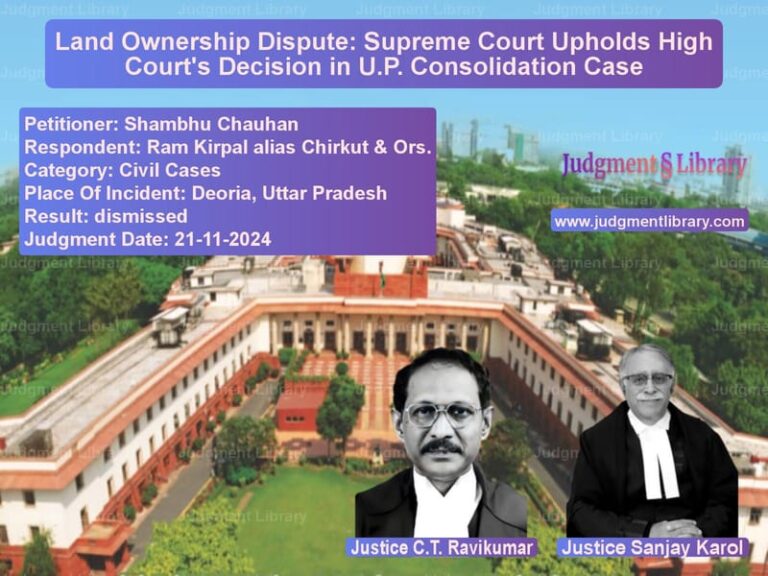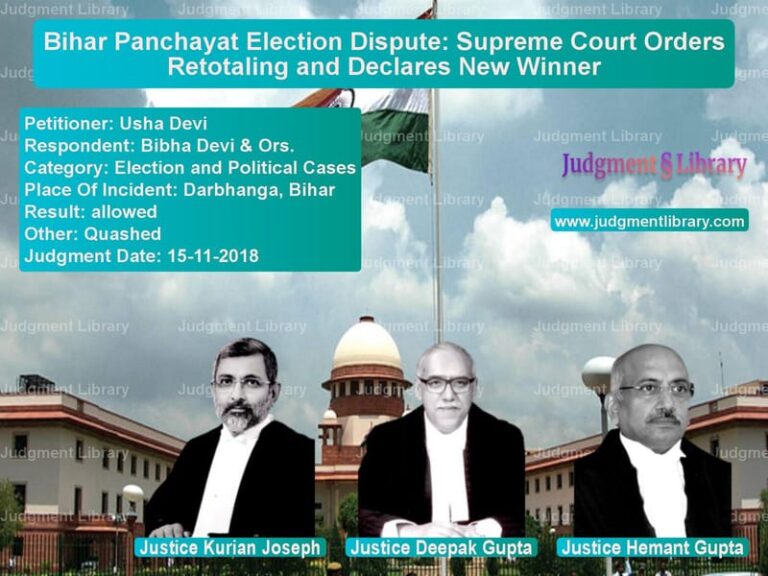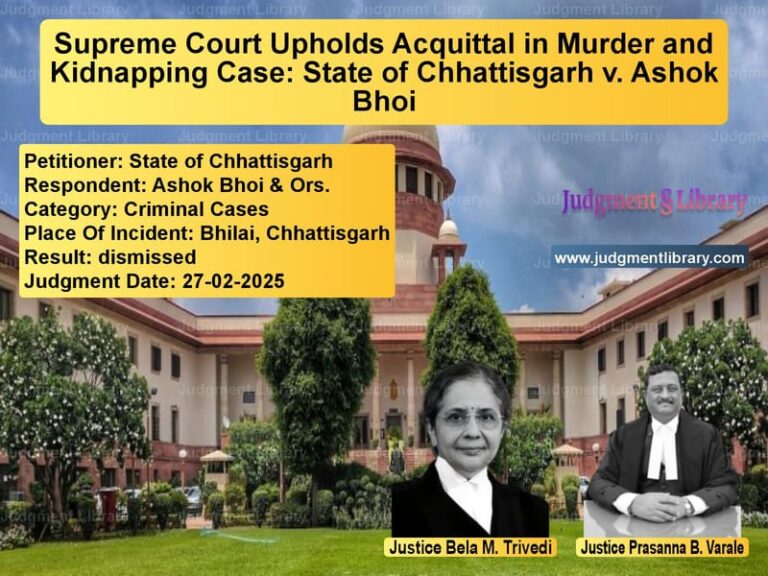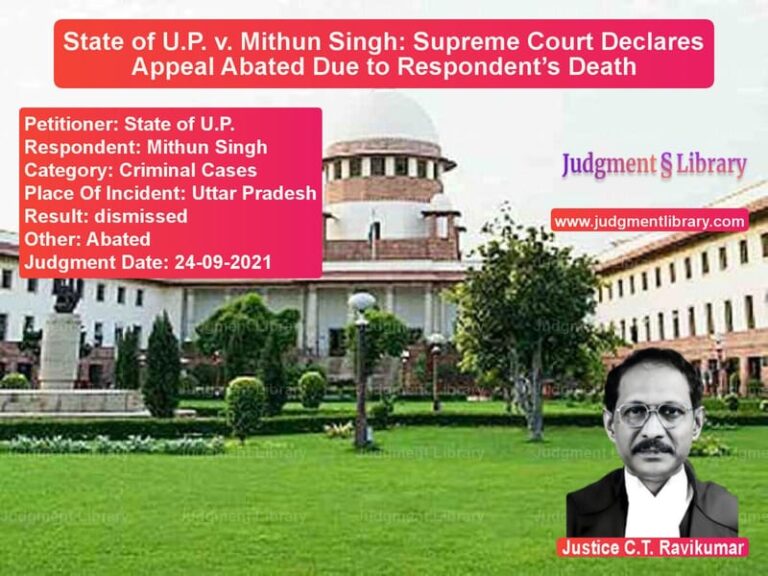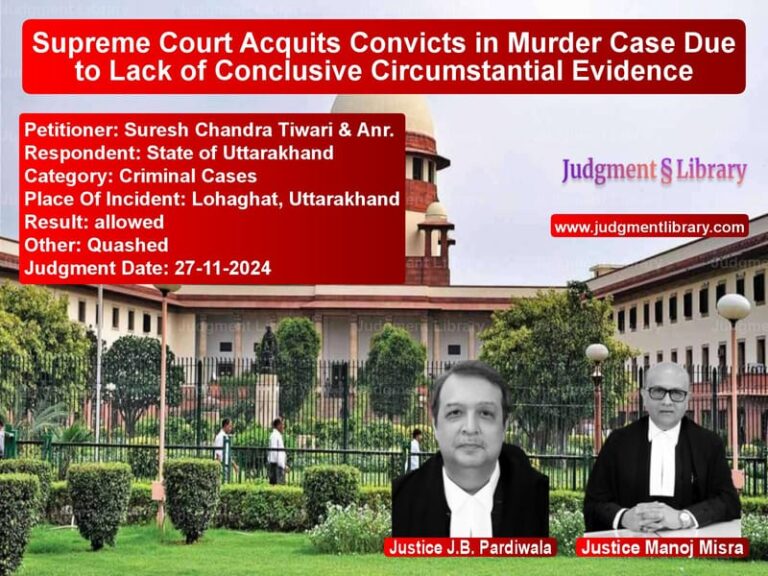Supreme Court Sets Aside Ex Parte Decree in Maharashtra Electricity Dispute
The Supreme Court of India recently delivered a significant judgment in the case of Y.P. Lele vs. Maharashtra State Electricity Distribution Company Ltd. The dispute dates back to 1988, when the Maharashtra State Electricity Board (MSEB) filed a civil suit against Miraj Electric Supply Co. Ltd. (MESC) and its directors for the recovery of Rs. 1,42,85,177.47. Over the years, multiple legal proceedings ensued, culminating in an ex parte decree passed by the trial court, which was later challenged before the Supreme Court.
The case raised fundamental legal questions concerning ex parte proceedings, the applicability of Order IX Rule 13 and Order XVII Rule 2 of the Civil Procedure Code (CPC), and the right to a fair trial. The Supreme Court ultimately ruled in favor of the appellant, setting aside the ex parte decree and allowing the trial to proceed on its merits.
Background of the Case
In 1988, the Maharashtra State Electricity Board (MSEB) initiated Special Civil Suit No. 125 of 1988 in the Court of Civil Judge, Senior Division at Sangli. The suit sought to recover outstanding dues amounting to Rs. 1,42,85,177.47 from Miraj Electric Supply Co. Ltd. (MESC) and its five directors. The suit also demanded interest at a rate of 18% per annum from the date of presentation until realization.
Initially, the defendants actively participated in the legal proceedings, filing their written statements and engaging in the trial. However, a crucial turning point occurred when their legal counsel, Shri. M.B. Karmarkar, withdrew his Vakalatnama and ceased representation. This led to procedural complications, ultimately resulting in an ex parte decree being issued against them.
Trial Court’s Ex Parte Decree
Following the withdrawal of the defendants’ counsel, the trial court directed the suit to proceed under Order XVII Rule 2 CPC due to the absence of the defendants. On January 29, 2005, the trial court decreed the suit ex parte. The judgment required all six defendants to pay the outstanding dues jointly and severally, along with interest at 18% per annum.
The operative portion of the trial court’s judgment stated:
“Suit is decreed ex parte with cost, as under:
- The defendants No. 1 to 6 jointly and severally to pay Rs. 1,42,85,177.47 to the plaintiff board (MSEB). They shall pay interest at the rate of 18% per annum on the arrears amount of Rs. 1,04,90,032.36 from the date of the suit till realization.”
On discovering the ex parte decree, the defendants filed an application under Order IX Rule 13 CPC on September 21, 2006, seeking to set aside the decree. They also filed an application for condonation of delay under Section 5 of the Limitation Act, 1963. The trial court, after examining their reasons for the delay, allowed the application on September 30, 2014, thereby restoring the suit.
High Court’s Reversal
Aggrieved by the trial court’s decision to set aside the decree, MSEB approached the Bombay High Court by filing a writ petition under Articles 226 and 227 of the Constitution. The High Court ruled in favor of MSEB on June 27, 2018, setting aside the trial court’s order and reinstating the ex parte decree. The High Court held that the application under Order IX Rule 13 CPC was not maintainable since the suit had been disposed of under Order XVII Rule 2 CPC, invoking its explanation.
Supreme Court’s Analysis
The appellant, Y.P. Lele, challenged the High Court’s decision before the Supreme Court. The key issue before the apex court was whether the High Court erred in applying the explanation to Order XVII Rule 2 CPC and whether the defendants were rightfully denied an opportunity to contest the suit.
The Supreme Court noted:
“Once the counsel had withdrawn his Vakalatnama, the Trial Court ought to have issued notice to the defendants to engage another counsel, which it did not do and proceeded ex parte.”
Furthermore, the court examined the applicability of Order XVII Rule 2 CPC and found that:
“The explanation under Order XVII Rule 2 CPC applies only where the party has led evidence or substantial evidence before failing to appear. In this case, the defendants had not led any evidence, and their counsel had even failed to cross-examine the witnesses.”
Supreme Court’s Judgment
After detailed deliberation, the Supreme Court ruled in favor of the appellant and set aside the High Court’s order. The court observed that the trial court had correctly exercised its discretion in allowing the application under Order IX Rule 13 CPC and restoring the suit.
The Supreme Court’s final ruling stated:
- The High Court’s order dated June 27, 2018, is set aside.
- The trial court is directed to proceed with Special Civil Suit No. 125 of 1988 on its merits.
- The ex parte decree stands vacated.
- 20% of the deposit made by the appellant shall be retained in a fixed deposit, while 30% shall be refunded.
Implications of the Judgment
This ruling underscores the importance of fair trial principles and procedural due process. It reinforces the notion that:
- Courts must exercise caution while proceeding ex parte, especially when defendants have not been given proper notice.
- Order IX Rule 13 CPC serves as an essential safeguard to ensure that genuine parties are not deprived of their right to contest a suit.
- The explanation under Order XVII Rule 2 CPC should be applied judiciously, keeping in mind the evidentiary contributions of the parties.
By setting aside the ex parte decree, the Supreme Court has reaffirmed the necessity of adjudicating disputes on their merits rather than procedural technicalities.
Petitioner Name: Y.P. Lele.Respondent Name: Maharashtra State Electricity Distribution Company Ltd..Judgment By: Justice Vikram Nath, Justice Ahsanuddin Amanullah.Place Of Incident: Maharashtra.Judgment Date: 16-08-2023.
Don’t miss out on the full details! Download the complete judgment in PDF format below and gain valuable insights instantly!
Download Judgment: y.p.-lele-vs-maharashtra-state-el-supreme-court-of-india-judgment-dated-16-08-2023.pdf
Directly Download Judgment: Directly download this Judgment
See all petitions in Contract Disputes
See all petitions in Damages and Compensation
See all petitions in Judgment by Vikram Nath
See all petitions in Judgment by Ahsanuddin Amanullah
See all petitions in allowed
See all petitions in supreme court of India judgments August 2023
See all petitions in 2023 judgments
See all posts in Civil Cases Category
See all allowed petitions in Civil Cases Category
See all Dismissed petitions in Civil Cases Category
See all partially allowed petitions in Civil Cases Category


